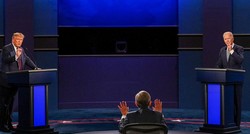President Donald Trump and Democratic nominee Joe Biden engaged in the first of three scheduled presidential debates on Tuesday, Oct. 3. Faculty speculate that the frequent interruptions by Trump were a strategy to derail the debate and draw media attention, but it may not have worked in his favor.
Fox news anchor Chris Wallace moderated the debate and struggled to keep the candidates from interrupting each other during their fixed speaking time. Wallace appealed to Trump to respect the debate format his campaign agreed to, and he declared a segment over when Trump would not stop talking.
“Trump is a handful to his advisers because he refuses to prepare, saying he’s been preparing during his four years in the White House, which is a cavalier statement as presidential debates require practice,” explained Joseph Patten, Ph.D., an Associate Professor of Political Science.
“Trump’s interruptions and turning the debate into a train wreck were due to a lack of preparation, so he did not want to debate,” he said.
Michael Phillips-Anderson, Ph.D., an Associate Professor of Communication, added that Trump’s behavior violates norms in ways that earn him “significant media attention.” “Whether it was strategy or instinct that led Trump to interrupt so frequently, it may not have the effect that he wanted,” he said.
Trump’s base might appreciate his aggressive persona, but he is behind in the polls and needs to appeal to more people, so if undecided voters tuned out early on, they are not likely to vote for him, or maybe even at all, Phillips-Anderson explained.
Most political communication research argues that the debates hold little sway over how people vote.
However, “Debates are the single most viewed part of a presidential campaign… there are many voters who don’t pay much attention until the debates. It is often the first time that some people are hearing the candidates,” Phillips-Anderson said.
Patten added that “[Trump] didn’t really do anything in that debate to expand his base, and his base isn’t big enough to win.” He would need to sway independents, college-educated white men, and uneducated white women, but Biden is eating into that white base.
Trump attempted to paint Biden as weak by pushing him around, so Biden needed to match that. He has the experience and knows policy, so his primary challenge was convincing people he has enough “gas in the tank,” Patten remarked. “Biden was off to a slow start but after the first 20 minutes he regrouped.”
Trump had a clear strategy: to prevent Biden from speaking as much as possible, explained Eric Schwartz, a senior political science student.
“The Trump campaign’s biggest fear is Biden appearing as a coherent and well-spoken candidate, so the constant interruptions helped to prevent that,” he continued.
“Having said that, Biden’s overall performance was still weak. He was very low energy and didn’t hammer on any specific policy points,” Schwartz concluded.
Biden employed the challenger strategy, mixed with a successor strategy, clarified Phillips-Anderson. He is trying to take credit for positive things that happened while he was in an office close to the presidency, but most vice presidents who later ran for president failed.
Conversely, “Trump only plays the challenger role. It is not an unusual strategy as even politicians who have served for a long time will run ‘against Washington.’ Still, Trump’s strategy of pointing out current problems and arguing that they are reflective of Joe Biden’s America is unusual,” Phillips-Anderson said.
Patten does not believe Trump resembles the candidate he was in 2016. “In 2016, he looked like he was having more fun, even if he wasn’t laying out serious policy proposals, he was enjoying being the rogue candidate,” he said. “The Republican establishment did not back Trump in 2016, and so his election was this fluke that happened that caught the country by surprise, and I think he was shocked that he won.”
“This is the first time Trump is running behind expectations, he has something to lose now,” Patten said.
IMAGE TAKEN from The Atlantic


